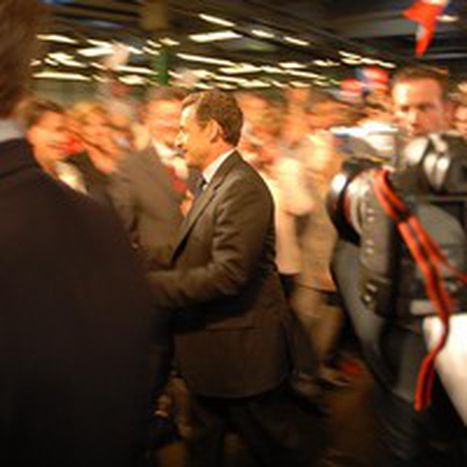
Beep beep Sarkozy
Published on
Translation by:
The French President is part of a new generation of Roadrunner politicians - is his inter-governmental strategy sufficient to revive the European Union?
Sarkozy’s first political gestures have been marked with a European seal - the new French President, 52, has well-fixed ideas towards his hopes for Europe.
On 4 June, Sarkozy met with Italian president Romano Prodi. On 31 May, he was in the company of Spanish prime minister Rodriguez Zapatero. Just one week earlier in Brussels, he was with the president of the European Commission, Durão Barroso of Portugal. The same evening Sarkozy took office at the Elysée on 16 May, he made his first official European trip to Germany to meet with his counterpart Chancellor Angela Merkel, who is priming to end her presidency of the European Union. Not forgetting 11 May, when he was already embracing the British retiring chief of government, Tony Blair.
Does this calculated turn by the leaders of the most powerful countries in the European Union foreshadow a new Europe going at multiple-speeds?
Protectionist pragmatism
In-between being snapped jogging with his new PM François Fillon in the outskirts of Paris, the former Union for a Popular Movement (UMP) leader is really not a true proponent for a peaceful Europe. This man, passenger pigeon, grand initiator of reforms and follower of rapid results, declared on 23 May in Brussels that he intended to separate the EU from 'this relative paralysis’ by 'finding a way out of this impasse and providing coherence to foreign policy.’
Sarkozy hopes to shake up the comfortable European Union, which is trapped in an eternal yawn of grandiose discourse, heavy words, an obsession with consensus and constitutional imbroglio. In fact, at the same meeting, Durão Barroso stressed his hopes that the new French chief of state's ‘voluntarism, enthusiasm and joy of politics’ would be at Europe's service.
As of now, Sarkozy wants to concentrate on the most urgent problems, attacking them without beating around any bushes. For him, the first objective is to support a ‘simplified treaty' that would summarise the common fundamental rights and politics: themes that have rightfully stirred up the distrust of Europeans and most particularly, its compatriots.
With regards to enlargement, despite not opposing the opening-up of fresh negotiations between the EU and Turkey, Sarkozy strictly maintains his position that ‘Turkey will not be entering our common borders’.
On institutional matters, the new president has pledged a way-out from the rule of unanimity; insisting on the urgency of accelerating decision making. His proposition is a system of qualified double majority, by countries and citizens.
Decided that things advance into the future, Sarkozy has not turned down the principle of ‘reinforced cooperation', which was intended by the Treaty of Nice (2001). Whether he will name a ‘board of directors’ through private unions or a ‘G-5 European’ between certain countries (France, Germany, Italy, Spain and the United Kingdom), he wants to put certain politics into place in a more profound way without being held back by the hesitations of other member states.
New preeminence of inter-governmentalism
The arrival of Nicolas Sarkozy at the Elysée is also synonymous with an intergovernmental vision of the European construction. It has already been marked in favour of participation by the twenty-seven governments in the decisions of the Central Bank of Europe, as well as the return to a certain European commercial protectionism with which he calls: ‘European preference', a notion which makes countries where the economy depends largely on exportation cringe, like Germany or the UK.
This strategy flagrantly illustrates the 23 May first meeting between Sarkozy and Durão Barroso in Brussels. Whilst parliament was in session at Strasbourg, the president of the Commision was preparing to leave the eastern French city for the European capital and welcome the French President officially.
The possible scenario: in the next few years, the odds are good that the UK – with Gordon at the helm – will try to negotiate a European budget reform to reduce the role of the Common Agricultural Policy (CAP), while France appeals to reestablish subsidised pricing for farmers.
Finally, Sarkozy considers non-negotiable what is judged by many as a logistic absurdity: namely parliament being situated in Strasbourg instead of Brussels, where the administrative hub is located - Brussels. Parliamentarians stay in Brussels for three to four weeks each month, which means that they only spend one week in the Alsatian capital for parliamentary plenary sessions.
Opportunity in the air
We live in an era during which the great powers stay absorbed by their own problems and it is probable that they don’t want to interfere with EU members. The United States are in the process of losing two wars; one in Iraq, the other in Afghanistan. Needless to say, President George Bush is in a bad position. In the East, at the same time, Putin is achieving his own presidential mandate.
The European Union is far from making a profit from this absence of two greats to imagine the long-term evolution of the European construction. Despite his dynamism and energy, Sarkozy has nothing which is visionary and needed to bring new life into the EU, to allow it to be not only democratic, but also united.
Translated from Sarko-bip-bip: el correcaminos europeo



